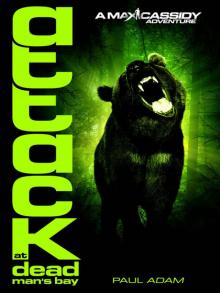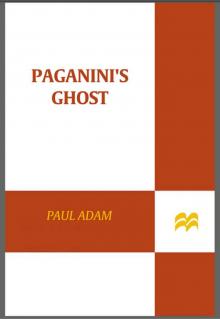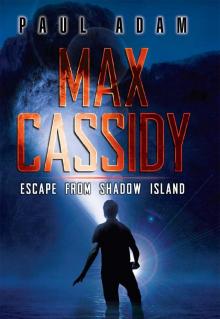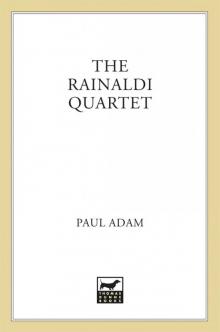Jaws of Death Read online
Page 11
Max’s escort unlocked the handcuffs. ‘Do what you have to do,’ he said sharply. ‘And make it quick.’
Max went into one of the cubicles. There was an old-fashioned toilet inside, with a high cistern and a long chain flush that looked Victorian. What is this place? Max thought. Padded cells, chain flushes – it’s like stepping back into the nineteenth century.
When he came out of the cubicle, he went across to the sinks and washed his hands. The warder watched him attentively. Max dried his hands on a paper towel and threw it into the waste bin.
‘Hands behind your back,’ the warder ordered.
He handcuffed him again and led him back to his cell. As the door swung shut and the key turned in the lock, Max lay down on the mattress and stared thoughtfully up at the ceiling. That had been a productive little excursion. Very informative. He had discovered a couple of useful things. Now all he had to do was work out how he could utilize those things to escape.
ELEVEN
Max did nothing except lie on his mattress and doze all afternoon and evening. Another meal was brought to him – a mixture of mince and mashed potato that was no doubt supposed to be shepherd’s pie but looked and tasted nothing like the shepherd’s pie Max was used to. This was a sort of bland slush that slopped around the plate and could be eaten only with a spoon. Max was beginning to see how the catering in this place worked – no food that required a knife and fork, or taste buds.
Afterwards he was handcuffed and taken along the corridor to the washroom. He saw no other people, no other prisoners and no sign in the washroom or toilets that anyone had used them before him. Max closed the cubicle door behind him – there were no locks on the doors – and sat down on the toilet seat. Just above his left shoulder was the dangling chain flush, its wooden handle polished smooth by countless prisoners’ fingers. He reached up and took hold of the chain; then, ensuring that he made no noise that would carry to the warder standing guard outside, used his fingers to prise open two of the links in the chain. The metal was old, but it was tough. Max had to use all his strength to force open gaps of just a few millimetres – not enough to remove the links, but it was all he had time for right now. He’d open the gaps wider on his next visit.
He stood up and inspected the chain. At a casual glance, you couldn’t tell that it had been tampered with. He pulled it, then went out and washed his hands and face at the sink. He asked the warder if he could have a toothbrush. The man shook his head.
‘Why not?’ Max said, hoping to start some kind of dialogue. If he could get the guard to loosen up a little, he might obtain answers to his other questions.
‘How long am I going to be here?’ he went on. ‘I’ll need a toothbrush. Where is this place, by the way?’
The officer ignored the questions and told Max to turn round and put his hands behind him. He handcuffed him again, led him back to his cell and locked him in. Max lay down on the mattress and stared at the ceiling some more. The worst thing about his incarceration, he realized, wasn’t being shut away in a cell with nothing to do; it was not knowing why he’d been brought here and how long he was going to be a prisoner. He was worried, there was no getting away from that. Very worried. Most people who ended up in prison had gone through some kind of formal procedure. They’d been arrested, charged by the police, tried by a court. But Max had had none of that. There was no record of him in the system and that frightened him. It meant that no one knew where he was, and no one would know what had happened if he just disappeared for good.
The night was just as boring as the day. The only indication Max got that it was actually night was the light in the ceiling going out. He curled up on the mattress to keep warm – there were no sheets or blankets provided – and went to sleep. He slept surprisingly well considering where he was, and when he woke the light was back on, so he assumed it must be morning. He did a few exercises to loosen up, then lay back down and waited.
Some time later – Max had no real idea exactly how much later – the cell door opened and a warder entered. It wasn’t the same warder as the previous evening, but he was just as large and just as reluctant to talk. Max tried asking him a few questions and met the same stone wall of silence. A kitchen orderly came in with breakfast – a paper plate bearing two thin slices of white toast and another styrofoam cup of water.
The routine followed the same course as the day before. Max ate the toast and drank the water, the jailer and orderly returned to collect the plate and cup, then Max was handcuffed and taken to the washroom, where he did more work on the toilet chain, prising open the links, but leaving them in place.
In the middle of the day he was brought a paper plate of pasta with a sloppy meat and tomato sauce on top of it, and a cup of water.
‘Where am I?’ he demanded when the warder and orderly came in. ‘I want to know. I have a right to know.’
The warder took no notice.
Max walked over to him. ‘Where the hell am I?’ he asked fiercely. ‘You can’t keep me here. You can’t keep me locked up.’
The man looked away as if Max were not there. That made Max even more angry. He made a sudden dash for the door – not because he had any serious hopes of escaping, but simply as an act of defiance: to show these people that he still had some fight in him. The warder grabbed hold of his arm and hauled him back easily.
Max glared up at him. ‘What kind of a person are you?’ he snarled. ‘Keeping a fourteen-year-old kid locked up in a padded cell. You should be ashamed of yourself.’
The warder pushed him back. His face was flushed. Good, Max thought. I’ve got a reaction at last.
‘Don’t get lippy with me,’ the officer said. ‘There are worse cells than this. Just you remember that.’
He backed out into the corridor, banged the door shut and locked it. Max looked down at the plate of food on the floor. He was sorely tempted to hurl it at the wall and smear the pasta and sauce everywhere, but he controlled himself. That would achieve nothing, and besides, he was hungry. There was no point in throwing away his lunch. He sat down cross-legged and ate the meal.
When the warder and orderly returned for the plate and cup, Max was handcuffed and escorted along the corridor. He thought he was being taken to the toilet, but they went right past the washroom and through a locked door into a different section of the prison. This looked like the administrative area, where the prison staff were based. Through an open door on the left, Max saw a small kitchen containing a table and chairs, a sofa and a sink with a kettle and a microwave on the worktop next to it. On the far side of the room was a door and a barred window through which Max caught a glimpse of a courtyard enclosed by red-brick buildings.
They kept going along a hallway and paused by a locked steel gate for the warder to take out his keys. Next to the gate was what looked like the main control room of the prison – a cramped little space with a desk and chair facing a bank of CCTV screens. There were five screens, all showing different images from around the prison: the perimeter fence, the main gate, the external walls, the corridors inside, cells containing lone men – so there were other prisoners here. There were five screens, but clearly more than five cameras, for the pictures kept changing as the system jumped from one camera to another. On a notice board just inside the room was pinned a staff rota. Max saw that there were three eight-hour shifts a day: 8 a.m. to 4 p.m., 4 p.m. to midnight, and midnight to 8 a.m. The night shift had considerably fewer staff on duty than the other two shifts.
The warder unlocked the gate and pushed Max through ahead of him, locking the gate behind them. They walked ten metres along another corridor and stopped again. The officer opened an unlocked door and escorted Max inside. They were in a square room with a metal table in the centre and two metal chairs next to it, both bolted to the floor. Seated on the chair facing the door was Rupert Penhall.
‘Hello, Max,’ he said smoothly. ‘Having a good time here?’
Max swore at him. It probably wasn’t a wise thing to
do, but he wasn’t going to show fear in front of this man. He wanted his contempt to be crystal clear.
Penhall seemed amused rather than offended. He gave a smug smile. ‘Well, I see your spirit hasn’t been broken. Yet,’ he added ominously.
‘Why’ve you kidnapped me?’ Max demanded. ‘What’s going on?’
‘Sit down,’ Penhall said.
He waited for Max to take the chair opposite and nodded at the warder. ‘You can leave us now.’
‘Are you sure, sir?’ the officer asked doubtfully.
‘He’s handcuffed, he won’t give me any trouble. I’ll call if I need you.’
The warder went out of the room. Max adjusted his position on the chair. He couldn’t sit back properly because of his manacled hands. ‘Why don’t you take off the cuffs?’ he said.
Penhall shook his head. ‘I don’t think so.’
‘You afraid of something? What? Are you afraid that I might escape? That I might attack you?’
Max was trying to rile him, to get him to drop his guard and maybe give away more information than he intended. But Penhall wasn’t going to rise to the provocation. He had a styrofoam cup of coffee on the table in front of him. He took a sip. Max watched him, longing to throw the coffee in his face.
‘You won’t escape from here,’ Penhall said.
‘Where am I?’
‘It’s called Mount Pleasant. An interesting name, don’t you think? Our Victorian ancestors aren’t known for being a bundle of laughs, but whoever christened this asylum clearly had a fine sense of humour.’
‘It’s an asylum? For lunatics?’ Max said.
‘Built in the eighteen fifties to house the country’s most dangerous – and most deranged – criminals. And still in use, as you’ve discovered, for people we want to detain without all the time-consuming complications of a court case.’
Max looked across the table. Behind Penhall’s shoulder was a barred window through which he had a good view of the courtyard outside. Mount Pleasant had been built in the form of a square, with an enclosed garden in the centre – a patch of lawn and shrubs around the edges. The four sides of the building were three storeys high, with ornate gothic turrets on the corners Max could see. In the middle of the far side was a high arched entrance, big enough to get a lorry through, which gave access to the garden from the front of the prison.
‘Why’ve you brought me here?’ Max asked.
‘Because you’re a pain in the neck,’ Penhall replied. ‘And I’m getting tired of your pathetic little games.’
‘My “pathetic little games”?’ Max echoed. ‘You mean trying to find out who framed my mum for a murder that was never committed, trying to get her out of prison, trying to find out why my dad was held prisoner on Shadow Island and drugged by Julius Clark? Is that what you’re talking about? They’re not games. They’re my parents’ lives.’
‘And what a good little boy you are to want to help them,’ Penhall sneered. ‘The brave son coming to the rescue. It would be admirable, if it weren’t so stupid.’
‘You think looking for justice is stupid?’
‘I’m a practical man, Max. I deal with realities, with the world as it is, not as people like you would have it.’
‘What’s that supposed to mean?’
‘It means you’re out of your depth. And you’re out of your mind if you think you stand a chance against Julius Clark.’
‘Why are you on his side? I don’t understand. You work for the British government. Shouldn’t you be protecting people like me? Shouldn’t you be helping me get my mum out of prison instead of locking me up and threatening me? Clark must be paying you an awful lot of money.’
Penhall smiled and took another sip of his coffee. ‘Don’t be so naïve, Max. Julius Clark is a friend of the British people. His companies provide jobs, they create wealth. Political leaders love him – not just here but all around the world. They love the cash he gives to their parties, they love going to stay with him on his estate in the Bahamas, they love his private jets, the food and wine he gives them, the cruises on his yacht in the Mediterranean. He’s a very popular man. And you, Max, what are you? A fourteen-year-old child with a missing father and a mother in prison.’
‘How long do you intend keeping me here?’
‘That depends on you. You cooperate, you get to go free. You don’t, you stay locked up.’
‘You couldn’t get away with that. My friends would ask questions – someone would find out where I was.’
‘I doubt it,’ Penhall said. ‘There are prisoners in Mount Pleasant who have been here for decades, who will die here without anyone knowing what’s become of them.’
‘I don’t believe you.’
‘People disappear in other parts of the world – vanish without trace. You think that doesn’t happen in Britain too? This place is perfect for detaining troublemakers – people who haven’t actually committed any offence, so they can’t be tried and imprisoned in the normal way, but who nevertheless are a thorn in the side of the authorities. People like you, Max.’
Max licked his lips. His mouth had suddenly gone dry. He knew that Penhall was telling him the truth. ‘You said if I cooperated, you’d let me go,’ he said. ‘Cooperate how?’
‘By stopping what you’re doing, by keeping your mouth shut, by telling your friends to do the same. You go to the press, or to the police, and we’ll shut you away for the rest of your life. Imagine that – another fifty or sixty years in that padded cell. Nothing to do, nobody to talk to, no hope of release or escape. You’re clever enough on stage with all your props and trick boxes, but you won’t escape from here. This place is one hundred per cent escape-proof.’
Penhall drank the last of his coffee and held up the styrofoam cup. He squeezed it in his fist, crushing it until it disintegrated into pieces. ‘You mess with me, Max,’ he said, ‘and I’ll crush you as easily as I crushed that cup. Think about that over the next few days.’
Penhall got up from his chair, walked past Max and opened the door. ‘He’s all yours,’ he said to the warder outside.
The officer came in and hauled Max to his feet. They went back out of the room and through the gate into the staff area. Max made a mental note of everything he saw: the control room, the CCTV screens, the kitchen, the keys the warder used to unlock the doors, including the door to his cell. All of it was important.
He lay down on the foam mattress as the jailer locked him in. Looking around this empty cell and imagining years of captivity in it sent icy shivers through his whole body. Could Penhall carry out his threat to make him disappear for the rest of his life? Max had no doubt that he could. But that wasn’t going to stop him doing what he had to do.
A lifetime in solitary confinement in Mount Pleasant was a terrible thought, but even more terrible was the thought of his mum being in prison for the next eighteen years. Max couldn’t let that happen. And he couldn’t let the people who had put her there get away with it. The same people who had kidnapped his father and Chris Moncrieffe, who had turned Redmond Ashworth-Ames into an invalid and had murdered John Richardson. Max was going to bring them to justice, whatever the cost to himself.
He pictured Penhall crushing the styrofoam cup in his hand and remembered what he’d said about Max to the warder – He won’t give me any trouble.
Oh, won’t I? Max said to himself. Just you see. I’m going to escape from Mount Pleasant. And I’m going to do it tonight.
TWELVE
The time passed incredibly slowly. Max was impatient to put his plan into action, but he knew he had to wait for the cover of darkness. He could do nothing until after nightfall. He lay on the mattress and dozed intermittently, grabbing as much sleep as he could now because he knew he wouldn’t get much later.
He was bored, but also tense and keyed up. He kept running over the details of his plan in his mind, wondering if it was going to work. There were a lot of things that could go wrong, a lot of things that depended on timing and a big d
ose of luck, but it was the only plan he had. All he could do was take a shot at it and pray that fate was on his side.
In the early evening the tedium was broken by the arrival of his meal. The warder unlocked the cell door as usual, then stood guard as a kitchen orderly brought in the food. There’d been a change of shift since Max’s meeting with Penhall. There was a different warder on duty now, the same one as the previous evening. He had kinder eyes than the day-shift officer. That gave Max hope. There was a question he needed answering.
He smiled at the man. ‘They took my watch away from me,’ he said. ‘Do you know what time it is, please?’
The warder hesitated, giving the question some thought and obviously deciding it was harmless, for he looked at his wrist and said, ‘Seven o’clock.’
‘Thanks,’ Max said.
He’d established contact – that was what he wanted. He’d got the officer to see him as a person, to communicate with him. That was a beginning that Max could try to work on later.
He ate his food, and when the warder and orderly came back for the dirty plate and cup he said, ‘Thank you,’ politely and asked if he could go to the toilet. The warder handcuffed him and led him down the corridor to the washroom, then stood outside the cubicle while Max went inside.

 Attack at Dead Man's Bay
Attack at Dead Man's Bay Paganini's Ghost
Paganini's Ghost Escape from Shadow Island
Escape from Shadow Island The Rainaldi Quartet
The Rainaldi Quartet Jaws of Death
Jaws of Death